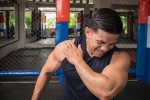Rotator Cuff Tears: When Should I Have Surgery?

When Rotator Cuff Surgery is Recommended
Your doctor may offer surgery as an option for a torn rotator cuff if your pain does not improve with nonsurgical methods. Continued pain is the main indication for surgery. If you are very active and use your arms for overhead work or sports, your doctor may also suggest surgery.
Other signs that surgery may be a good option for you include:
- Your symptoms have lasted 6 to 12 months
- You have a large tear (more than 3 cm) and the quality of the surrounding tendon tissue is good
- You have significant weakness and loss of function in your shoulder
- Your tear was caused by a recent, acute injury
Surgical Repair Options
There are a few options for repairing rotator cuff tears. Advances in surgical techniques for rotator cuff repair include less invasive procedures. While each of the methods available has its own advantages and disadvantages, all have the same goal: getting the tendon to heal back to bone.
The type of repair performed depends on several factors, including:
- Your surgeon's experience and familiarity with a particular procedure
- The size of your tear
- Your anatomy
- The quality of the tendon tissue and bone
Most surgical repairs can be done on an outpatient basis and do not require you to stay overnight in the hospital. Your orthopaedic surgeon will discuss with you the best procedure to meet your individual health needs.
You may have other shoulder problems in addition to a rotator cuff tear, such as:
- Biceps tendon tears
- Osteoarthritis
- Bone spurs
- Other soft tissue tears
During the operation, your surgeon may be able to take care of these problems, as well.
All-Arthroscopic Repair
During arthroscopy, your surgeon inserts a small camera, called an arthroscope, into your shoulder joint. The camera displays a live video feed on a monitor, and your surgeon uses these images to guide miniature surgical instruments.
All-arthroscopic repair is usually an outpatient procedure and is the least invasive method to repair a torn rotator cuff.
Rehabilitation
Rehabilitation plays a vital role in getting you back to your daily activities. A physical therapy program will help you regain shoulder strength and motion.
Immobilization/Sling: After surgery, therapy progresses in stages. At first, the repair needs to be protected while the tendon heals. To keep your arm from moving, you will most likely use a sling and avoid using your arm for the first 4 to 6 weeks. How long you require a sling depends on the severity of your injury.
Passive exercise/Early PT: Even though your tear has been repaired, the muscles around your arm remain weak. Once your surgeon decides it is safe for you to move your arm and shoulder, a therapist will help you with passive exercises to improve range of motion in your shoulder. With passive exercise, your therapist supports your arm and moves it in different positions. In most cases, passive exercise is begun within the first 4 to 6 weeks after surgery.
Active exercise/Mid Recovery PT: After 4 to 6 weeks, you will progress to doing active exercises without the help of your therapist. Moving your muscles on your own will gradually increase your strength and improve your arm control. At 8 to 12 weeks, your therapist will start you on a strengthening exercise program.
Return to Work/Sport: Expect a complete recovery to take several months. Most patients have a functional range of motion and adequate strength by 4 to 6 months after surgery. Although it is a slow process, your commitment to rehabilitation is key to a successful outcome.
Outcome
The majority of patients report improved shoulder strength and less pain after surgery for a torn rotator cuff. Surgeon expertise is more important in achieving satisfactory results than the choice of technique.







